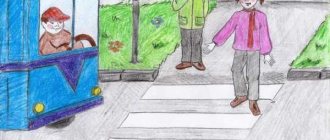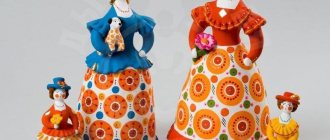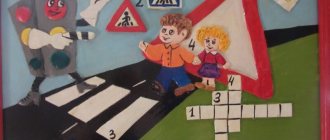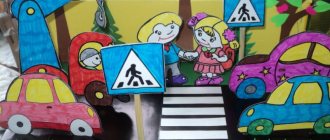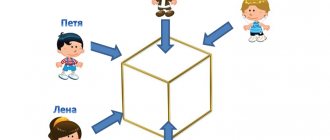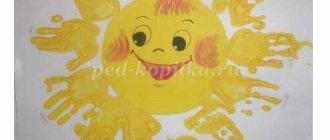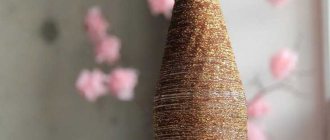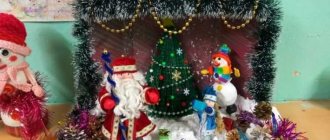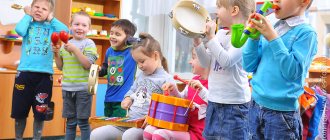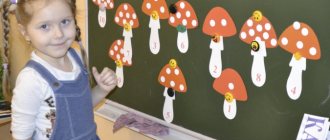Crafts from pine cones
Cones for work are collected in the fall. But by the winter holidays they will be completely dry and ready for work.
Christmas tree
You can turn a separate cone into a Christmas tree if you paint it and decorate it with beads. A large tree made of pine cones will look more impressive at an exhibition or children's creativity competition.
To work you will need:
- cardboard cone;
- thick glue or plasticine;
- paints, large beads or small balls.
The cones are simply glued onto the prepared cone. Empty areas can be covered with beads or textile bows. There is no need to paint the craft.
Winter crafts for school
Already in the first grade, children learn to work with scissors, an awl, and needles. The variety of techniques is increasing. School winter crafts can include complex folding, origami, corrugation and independently developed complex shapes. The rest depends on imagination and material.
Made from natural material
Most children are already familiar with the principles of turning pine cones into animals. In school crafts, complexity increases and small details appear.
For work, you can offer materials available in winter:
- cones and twigs;
- acorns, nuts;
- dried fruits and seeds;
- moss, dry autumn leaves.
You can use the collection left over from the fall.
From plastic bottles
Even adults are interested in crafts made from plastic bottles. The only limitation is that children are usually not trusted to cut plastic. Sharp edges can cause injury to children. But the bottle can be pasted over and painted. Transparent ones can be filled by painting the inside.
Penguins
To create funny penguins you will need two identical bottoms. Regular soda or mineral water bottles will do.
Snowflakes
Adults will have to cut and burn the bottoms of bottles in advance. This will prevent children from getting hurt on sharp edges. If you glue two identical bottoms together, you can fill the mold with colored cotton wool or confetti.
From pasta
The variety of pasta products in stores is huge. It would be unwise not to use this budget material. To expand the scope for creativity, you can invite children to create a common piggy bank. Then spaghetti, shells, original spirals, and flowers will appear in the works.
Herringbone
For a simple and effective Christmas tree you will need 100 g of ordinary pasta feathers. The craft is based on a cardboard cone. No less impressive works are obtained from bows or spirals. You can also put beads in shells fixed in the shape of boats - they will replace Christmas tree decorations.
Snowflakes
The easiest way to make snowflakes is from stylized flowers. With a little imagination, you can find a use for any pasta. After gluing, the toys are easily painted with regular gouache.
Christmas balls
The basis for the Christmas tree decoration is a small balloon. You can use any pasta. The main condition is that they must stick tightly to each other, but not to the ball. Then the base can be blown off, and the lace toy can be painted and decorated.
Bead crafts
Beads are a difficult material to work with. It requires skill and thoroughness. You can offer such ideas to children from 10 years old.
Snowflakes
To ensure that the craft retains its shape, the work is done on thin wire. In this case, a needle is not required. But you need basic diagrams - notes in what order to collect the snowflake - center and rows or each ray separately. You can diversify the ornaments with large beads, glass beads, and sequins.
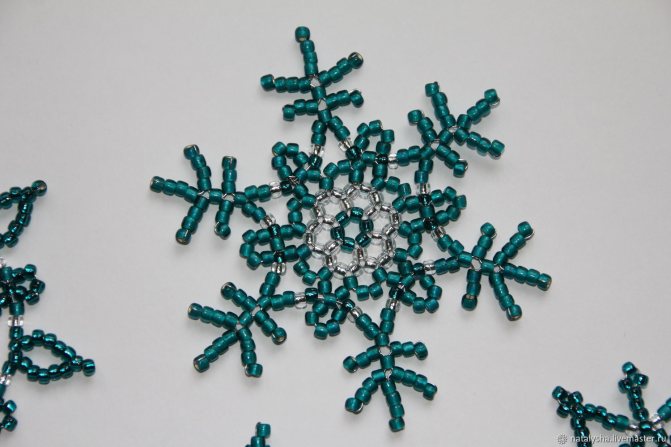
Herringbone
The spruce branch will even hold on to the fishing line. Each branch is a thread threaded through 3-4 beads on a “back and forth” principle with one transverse at the tip. Children can be shown the diagram and asked to choose their own size and color.
Angel
Simple flat angels are assembled from beads and beads in a few minutes. To make a three-dimensional craft, you need to change the triangular base to a cone. If you master the technique, the hem can be made lace.
Other ideas
Materials for winter crafts can be threads, felt, felt, lace and satin ribbons - any textile. There is a use for popsicle sticks and toothpicks. Cotton pads and just cotton wool will look great. The main thing is to look at waste materials from a different angle.
You can add extra shine to your work with shiny nail polish and loose glitter. If you don’t have them on hand, you can simply finely chop tinsel or rain.
Winter paper crafts
Kids work with ready-made forms made of paper or cardboard, which the teacher cut out in advance. Using a safe glue stick, you can use them to make appliqués and simple three-dimensional shapes that even a junior beginner can handle.
Older children can mark the template and cut out the shapes themselves. In this case, the paper can be either purchased or waste - scraps of silk or textured wallpaper of the appropriate color can become both part of the composition and an excellent background.
Snowman
There are hundreds of options on how to add a snowman to your winter crafts with your own hands. For a volumetric option, you can use cotton wool, rolled into balls and colored toilet paper, cones, plastic bottles and even plastic cups.
A light and unusual snowman will be made from white threads and a balloon. The very idea of such a winter craft will appeal to children of any age.
To work you will need:
- threads (fluffy ones are easier to work with);
- small balloons;
- starch and accessories (hat, buttons, nose).
The balloons must be inflated to the desired size and tied tightly. We wind the threads around the balls, crossing them randomly. There is no need to achieve a solid ball; a spectacular web is enough. Soak the finished balls for 1-2 hours in a strong starch solution and then dry. After this, the balls can be carefully deflated or pierced, and the finished forms can be used to create a snowman.
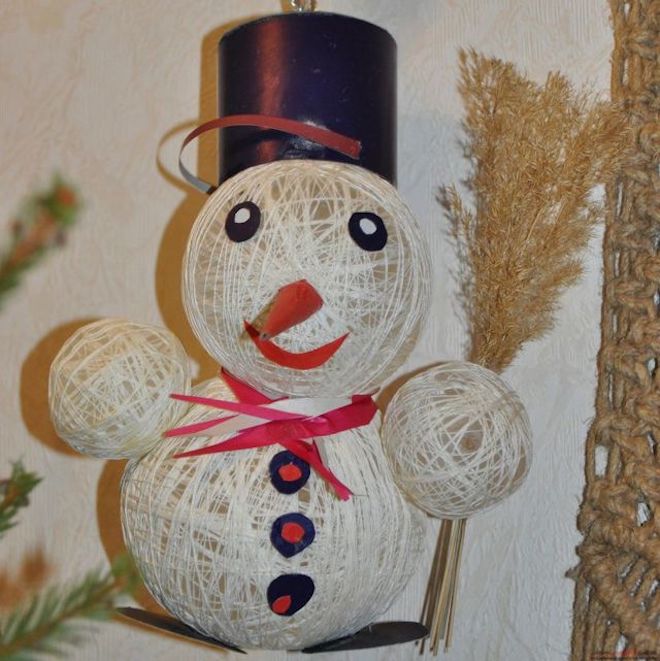
The same variety of techniques can be offered for flat applications. Even if children do not know how to cut yet, they can take ready-made materials:
- paper napkins with lace edge;
- cotton pads;
- cotton wool glued in pieces;
- fabric scraps.
Even if children repeat the work after the teacher, at the end of the lesson you can offer to show imagination and add a New Year’s theme to the work - decorate the collage with sequins or confetti, turning them into Christmas tree decorations on painted New Year trees.
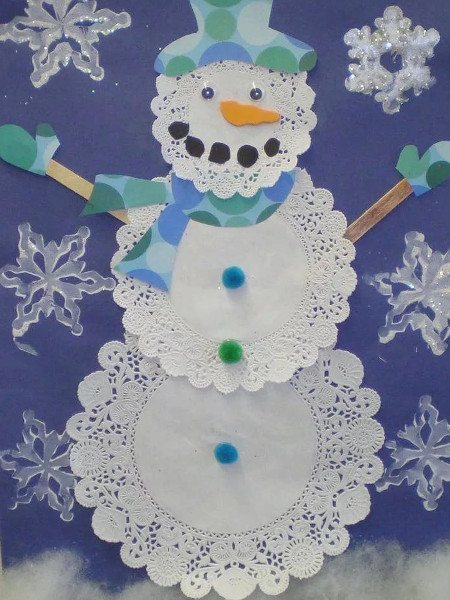
Other ideas:
